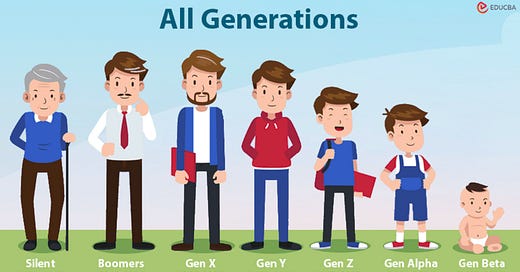Sunday Morning Read: Why Are We Calling Our Next Generation 'Beta'? The Surprising Truth Behind The Name That's Causing a Stir
The latest generation just got labeled 'Beta,' and not everyone's happy about it. Here's why it might be the perfect name for our AI-driven future and why change leadership is crucial in this new era.
The Beta Controversy
Let's address the elephant in the room: yes, they're calling them "Beta." Social media has erupted with criticism, pointing out that "beta" is often used as a pejorative term, especially online. But before you join the chorus of skeptics, consider this: in the tech world, "beta" represents something very different—it's the newer, better version. It's the 2.0. And in a world increasingly shaped by technology, that meaning might be more relevant than ever.
The naming of this generation comes from McCrindle, the Australian research firm that previously coined "Generation Alpha." According to founder Mark McCrindle, the choice of "Beta" isn't just alphabetical convenience—it carries deeper significance in our tech-driven world.
"If we think about the general use of beta in a software or technology sense—it's the new and improved version. It's the updated version. It's the 2.0. And that's what I think of beta as, and I think that's perfectly appropriate," McCrindle explains.
A Generation Defined by AI
While Millennials witnessed the birth of the internet and Gen Z mastered social media, Generation Beta (born 2025-2039) will be the first to experience artificial intelligence as a fully integrated part of daily life. They won't know a world without AI-powered education, healthcare, and entertainment. For them, the line between digital and physical reality will be increasingly blurred.
But there's an interesting twist to this digital immersion. Unlike previous generations, Gen Beta will be raised by parents who've seen both the promise and perils of technology. These Gen Z parents, having navigated the complexities of social media and digital addiction, are likely to approach AI with a more nuanced perspective.
The New Digital Balancing Act
Perhaps the most fascinating aspect of Generation Beta's development will be how their tech-savvy but cautious parents navigate the AI landscape.
We're likely to see a generation raised with intentional "tech-free" experiences—not as a rejection of technology, but as a complement to it.
Think AI-powered learning sessions balanced with deliberate outdoor adventures, or virtual social connections complemented by real-world community engagement.
Why Change Leadership is Critical for Generation Beta
This is where the need for effective change leadership becomes paramount. The rapid advancements in AI and its integration into every facet of life will necessitate leaders who can:
Embrace and adapt to technological change: Leaders must be comfortable with AI and its implications, and be able to guide their organizations and communities through this transformative period.
Champion ethical AI practices: As AI becomes more pervasive, ethical considerations become increasingly important. Leaders need to advocate for responsible AI development and use, ensuring fairness, transparency, and accountability.
Foster critical thinking and digital literacy: Generation Beta will need to be equipped with the skills to navigate a world saturated with information and AI-driven tools. Leaders must promote education that emphasizes critical thinking, problem-solving, and digital literacy.
Bridge the digital divide: Access to technology and AI will not be equitable. Leaders must work to ensure that all members of Generation Beta have the opportunity to thrive in this new era, regardless of their socioeconomic background.
Cultivate human connection: While AI will enhance many aspects of life, it cannot replace the fundamental need for human connection. Leaders must create environments that foster empathy, collaboration, and genuine relationships.
Beyond the Digital Frontier
Despite the heavy focus on technology, McCrindle emphasizes a crucial point: the fundamental human experience remains unchanged. "Technology comes and goes," he notes, "but the timeless human drivers of connection, relationship, hope, understanding, and trust—all of that is timeless."
This perspective offers a compelling framework for understanding Generation Beta. While they'll be the most technologically integrated generation in history, they may also be the one that most actively seeks to balance digital capability with human connection.
Looking Ahead
As we welcome the first members of Generation Beta, we're not just witnessing the birth of a new generation—we're seeing the emergence of a new way of being human. These children will navigate a world where AI is omnipresent, but they'll do so with parents who understand the importance of maintaining humanity in an increasingly digital world.
The name "Beta" might have sparked some initial jeering on social media, but it's becoming clear that this generation won't be defined by the traditional meaning of the term. Instead, they'll represent humanity's next iteration—one that combines technological fluency with a deep appreciation for human connection.
As we watch this generation take shape, one thing becomes certain: Generation Beta won't just be living in the future—they'll be actively shaping it, armed with both technological prowess and human wisdom. And that might be exactly what our world needs.
The success of Generation Beta will depend heavily on the leaders who guide them through this uncharted territory. By embracing change, promoting ethical AI practices, and fostering essential human skills, leaders can empower Generation Beta to reach their full potential and shape a future that is both technologically advanced and deeply human.





Wow. I didn’t think about “Generation Beta (born 2025-2039) will be the first to experience artificial intelligence as a fully integrated part of daily life.”
Now I’m interested in how it will impact their lives. For some reason Star Trek comes to mind.
Let’s talk about that image you chose to use, which depicts the currently 30-40yr old GenY as college students.